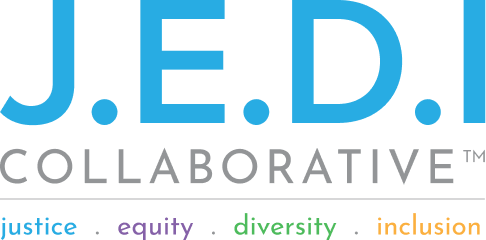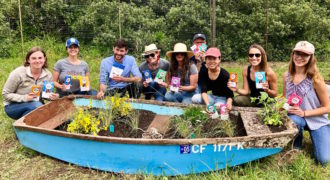We commit to supporting the COMMUNITIES who are the backbone of our industry to thrive
Expand to view each of the Communities Commitments including strategies, success indicators, resources, and solutions partners:
Engage in reciprocal and mutualistic relationships with grassroots and community-based organizations who can support our industry in amplifying our impact
Success looks like:
Companies have more community-based partners (nonprofits, local government agencies, schools, healthcare, social service organizations, and more)
Strategies may include:
- Forge equitable partnerships with grassroots organizations
- Provide trust-based grants to partners and grassroots organizations
- Engage in co-investment with grassroots organizations
- Partner with research groups to study innovative company-community relationships in an effort to support both communities’ and companies’ well-being
- Support marginalized communities in the areas where we are based by sponsoring staff volunteering in direct service-oriented (but not savioristic or paternalistic) projects with community-based organizations
Resources:
Ensure the communities in our supply chains are able to thrive
Success looks like:
- 80%+ compliance on SEDEX social/equity audit by suppliers
- # of ingredients certified fair trade (where applicable)
- Increased number of women, black, indigenous and people of color in leadership positions
- All employees are paid livable wages
- All employees have a safe work environment
Strategies may include:
- Conduct a social impact assessment in your supply chain to assess: environmental degradation & community impact, decision making power disparities for women and BIPOC , access to rights like water, safe food, education, etc, leadership opportunities, livelihoods.
- Support and prioritize women and minority-owned and women-and minority led organizations in our supply chains, particularly in developing economies
- Create the conditions for women’s and BIPOC’s voices to be heard and for full participation
- Highlight the communities contributing to the product in product marketing and advertising
- Engage in fair trade practices and certify ingredients in your supply chain as fair trade
- Implement and/or support anti-human trafficking measures in supply chain
- Provide economic support to communities in supply chain ($$ or through in-kind contributions such as building necessary infrastructure as determined by the community or partnerships with 3rd parties to invest money or services)
- Screen suppliers for fair social practices and work with experts to update the screening tools in order to use creative and dynamic means to get the needed information
- Retain suppliers who create employment opportunities for low income or chronically underemployed populations
- When making field visits, seek to build trust and meaningful relationships with workers (especially women and BIPOC workers) in order to best understand their lives and co-create solutions to issues they are facing.
Resources:
Solutions Partners:
Seek out vendors outside the supply chain who value J.E.D.I
Success looks like:
More vendors who are women-owned, minority-owned, or B Corps.
Strategies may include:
- Educate vendors on J.E.D.I practices
- Ensure vendor qualifications include a J.E.D.I commitment
- Seek vendors who support J.E.D.I values (B Corps, Women owned businesses, minority-owned businesses)
- Ensure procurement processes require at least one B Corps, woman-owned, and minority-owned business support proposals for consideration.
Resources:
Solutions Partners:
Support North American indigenous communities
Success looks like:
Solid education and enlightenment for all businesses and working with Native owned businesses where logical and possible.
Strategies may include:
- Support efforts to restore and maintain indigenous ways (including language and foodways)
- Support indigenous owned natural products businesses
- Address cultural appropriation of indigenous heritage in food branding, naming, marketing, messaging, trade dress, and more
- Learn about what decolonization means in the context of the natural products industry and its operations in North America (through articles, books, workshops, etc.)
- Become familiar with and directly support indigenous communities on whose ancestral lands we operate
- Land Acknowledgment before organized events and gatherings
- Education for employees about Native Americans (especially current contemporary info), including onsite cultural events with guest speakers, local tribal dignitaries, and also if possible special presentations during November (Native American Heritage month)
Resources:
- All My Relations Podcast on Cultural Appropriation
- The Avarna Group Resources Page (search for resources on cultural appropriation)
- The Sagorea Te’ Land Trust’s Shuumi Land Tax for Northern California East Bay Businesses
- American Indian Foods Producer Directory
- List of all tribal nations in the US
- Map of Indigenous lands
- Native American Films
- Education about American Indians and Alaska Natives
- Native Appropriations
- Inclusive Community Consulting
- NDN Collective
- National Center for American Indian Enterprise Development (NCAIED)
- Native American Division of the Boys & Girls Clubs
Solutions Partners:
Take public policy action related to Communities work
Success looks like:
Advocating for policies that address: expansion of regenerative and sustainable agriculture, fair pay for workers, food purchasing programs, farm justice issues, farmworker safety and climate justice.
Strategies may include:
- Support the Carbon Capture Improvement Act of 2019
- Support the Climate Stewardship Act of 2019
- Support Good Food Purchasing Programs
- Support the Farming Opportunities Training and Outreach (FOTO) Program
Resources:
- ASBC
- Carbon Capture Improvement Act of 2019
- Climate Stewardship Act of 2019
- Good Food Purchasing Programs
- Farming Opportunities Training and Outreach (FOTO) Program
- Farm System Reform Act of 2019
- Food and Agribusiness Merger Moratorium and Antitrust Review Act of 2019
- Hunter College NYC Food Policy Center
- CUNY Urban Food Policy Institute
- PolicyLink



